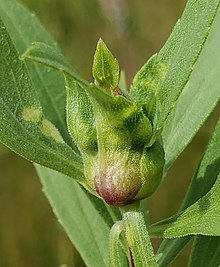| Dasineura folliculi | |
|---|---|

| |
| Gall of D. folliculi | |
|
Scientific classification
| |
| Domain: | Eukaryota |
| Kingdom: | Animalia |
| Phylum: | Arthropoda |
| Class: | Insecta |
| Order: | Diptera |
| Family: | Cecidomyiidae |
| Genus: | Dasineura |
| Species: | D. folliculi
|
| Binomial name | |
| Dasineura folliculi Felt, 1908
| |
| Synonyms | |
| |
Dasineura folliculi is a species of gall midge that induces galls on several species of goldenrod in North America. [1] It was first described by Ephraim Porter Felt in 1908. [1] Adults live for only one to three days, mating near the goldenrod before laying eggs between leaves. Larvae are gregarious, with anywhere between five and eighty in a gall. The larvae mature within three to four weeks of hatching. [2]
References
- ^ a b R.J. Gagne; M. Jaschof (2021). A Catalog of the Cecidomyiidae (Diptera) of the World (5th ed.). ISBN 978-0-9863941-3-3. Wikidata Q109561625.
- ^ N Dorchin; E R Scott; C E Clarkin; M P Luongo; S Jordan; W G Abrahamson (23 February 2009). "Behavioural, ecological and genetic evidence confirm the occurrence of host-associated differentiation in goldenrod gall-midges". Journal of Evolutionary Biology. 22 (4): 729–739. doi: 10.1111/J.1420-9101.2009.01696.X. ISSN 1010-061X. PMID 19243490. Wikidata Q51180844.
| Dasineura folliculi | |
|---|---|

| |
| Gall of D. folliculi | |
|
Scientific classification
| |
| Domain: | Eukaryota |
| Kingdom: | Animalia |
| Phylum: | Arthropoda |
| Class: | Insecta |
| Order: | Diptera |
| Family: | Cecidomyiidae |
| Genus: | Dasineura |
| Species: | D. folliculi
|
| Binomial name | |
| Dasineura folliculi Felt, 1908
| |
| Synonyms | |
| |
Dasineura folliculi is a species of gall midge that induces galls on several species of goldenrod in North America. [1] It was first described by Ephraim Porter Felt in 1908. [1] Adults live for only one to three days, mating near the goldenrod before laying eggs between leaves. Larvae are gregarious, with anywhere between five and eighty in a gall. The larvae mature within three to four weeks of hatching. [2]
References
- ^ a b R.J. Gagne; M. Jaschof (2021). A Catalog of the Cecidomyiidae (Diptera) of the World (5th ed.). ISBN 978-0-9863941-3-3. Wikidata Q109561625.
- ^ N Dorchin; E R Scott; C E Clarkin; M P Luongo; S Jordan; W G Abrahamson (23 February 2009). "Behavioural, ecological and genetic evidence confirm the occurrence of host-associated differentiation in goldenrod gall-midges". Journal of Evolutionary Biology. 22 (4): 729–739. doi: 10.1111/J.1420-9101.2009.01696.X. ISSN 1010-061X. PMID 19243490. Wikidata Q51180844.
